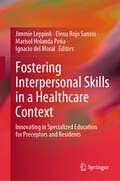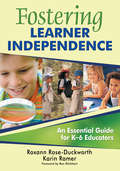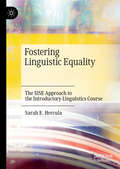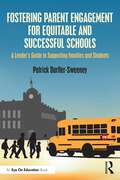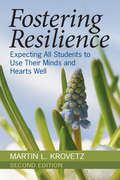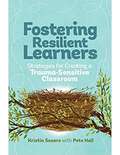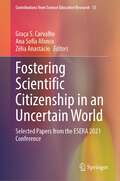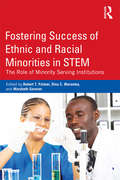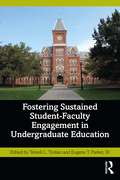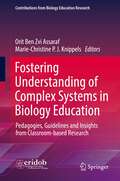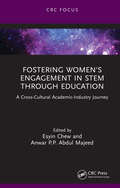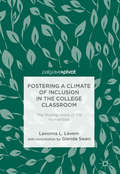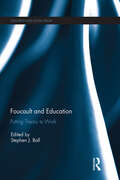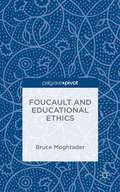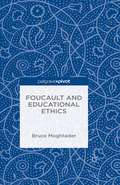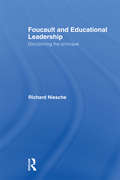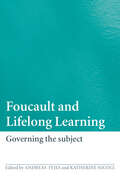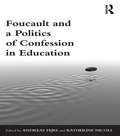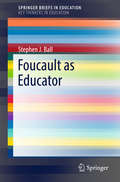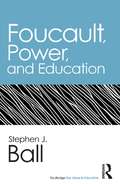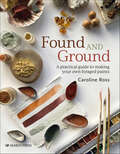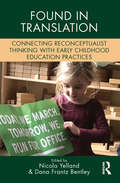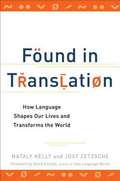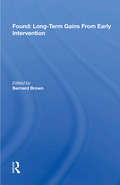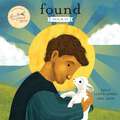- Table View
- List View
Fostering Interpersonal Skills in a Healthcare Context: Innovating in Specialized Education for Preceptors and Residents
by Jimmie Leppink Elena Rojo Santos Marisol Holanda Peña Ignacio Del MoralThis professional book reports on the development, implementation, evaluation, and further improvement of an innovative training program for preceptors (tutors) and residents in a specific healthcare context. It draws on key literature in internationally recognized journals and books, uses important legal considerations from the local context, and applies well-established principles from longitudinal and mixed-methods research. It also provides a coherent review of the state-of-the-art of the literature on the matter, outcomes of a three-year project in which research was longitudinally integrated into two training programs—one for preceptors (tutors) and one for residents—as well as lessons learned from this project. Practitioners and local healthcare providers can learn step-by-step how to work toward truly innovative training programs for their professionals and residents and how to develop a culture based on human professional values as well as continuous quality improvement. Simultaneously, researchers can learn how to integrate research into training programs in order to create better programs and establish a sustainable line of research that responds to social accountability questions of local healthcare providers. Finally, this book helps politicians to acquire an in-depth understanding of what it takes to innovate teaching and training in a healthcare system that has been under tremendous pressure and how funding in near future may be allocated in order to facilitate that innovation and its future. While this book focuses on a local healthcare context, the training programs and empirical studies around it as presented in the book can be replicated in local healthcare settings anywhere else and can be used to facilitate future inter-institutional collaborations for both training and research.
Fostering Learner Independence: An Essential Guide for K-6 Educators
by Roxann Rose-Duckworth Karin RamerThis book helps teachers reflect on practices that help students develop self-sufficiency, good work habits, self-motivation, resiliency, and critical thinking skills so they can learn independently.
Fostering Linguistic Equality: The SISE Approach to the Introductory Linguistics Course
by Sarah E. HerculaThis book offers one possible solution in the pursuit of linguistic equality by exploring how the Structural Inquiry of Stigmatized English (SISE) approach to linguistics pedagogy can be used to empower linguistics students and researchers as ambassadors for change. By using stigmatized varieties of English (including African American English, Chicano English, and Appalachian English) as the primary linguistic data analyzed through detailed structural analysis, the SISE approach fosters linguistically principled and pluralistic language attitudes among students, as evidenced by the author’s own empirical research in applying the method. This book not only advocates for linguistic equality but also provides teachers and researchers with the tools they need to counteract prejudicial attitudes and disinformation about language both in and outside the classroom. It will be an essential resource for linguistics teachers, applied linguists, curriculum developers, students and scholars of language attitudes and language variation, and anyone seeking more information about the relationships between diversity, (in)equality, and language.
Fostering Parent Engagement for Equitable and Successful Schools: A Leader’s Guide to Supporting Families and Students
by Patrick Darfler-SweeneyFostering Parent Engagement for Equitable and Successful Schools acknowledges and unpacks what educators have known for a long time: parents are the primary teachers of their children. This engaging book explores how schools can improve their relationship with parents and caregivers to develop a more equitable educational environment for all students. Designed for district and school leaders, this practical book helps readers apply the many leadership lessons taught in training programs and education leadership courses to improve their parent engagement as a function of effective education and not compliance. Full of real-world examples, reflection questions, “Actionable Ideas” checkpoints, and additional resources, this valuable resource encourages reflection while challenging leaders to improve and leverage parent and caregiver involvement in their children's education.
Fostering Resilience: Expecting All Students to Use Their Minds and Hearts Well
by Martin L. KrovetzThis guide identifies the characteristics of resilient learning communities, revisits schools from the first edition, and offers case studies, sample questionnaires, strategies, and tools for self-evaluation.
Fostering Resilient Learners: Strategies for Creating a Trauma-sensitive Classroom
by Pete Hall Kristin SouersIn this galvanizing book for all educators, Kristin Souers and Pete Hall explore an urgent and growing issue--childhood trauma--and its profound effect on learning and teaching. <P><P> Grounded in research and the authors' experience working with trauma-affected students and their teachers, Fostering Resilient Learners will help you cultivate a trauma-sensitive learning environment for students across all content areas, grade levels, and educational settings. The authors--a mental health therapist and a veteran principal--provide proven, reliable strategies to help you <P><P> * Understand what trauma is and how it hinders the learning, motivation, and success of all students in the classroom. * Build strong relationships and create a safe space to enable students to learn at high levels. * Adopt a strengths-based approach that leads you to recalibrate how you view destructive student behaviors and to perceive what students need to break negative cycles. * Head off frustration and burnout with essential self-care techniques that will help you and your students flourish. <P><P> Each chapter also includes questions and exercises to encourage reflection and extension of the ideas in this book. As an educator, you face the impact of trauma in the classroom every day. Let this book be your guide to seeking solutions rather than dwelling on problems, to building relationships that allow students to grow, thrive, and--most assuredly--learn at high levels.
Fostering Scientific Citizenship in an Uncertain World: Selected Papers from the ESERA 2021 Conference (Contributions from Science Education Research #13)
by Graça S. Carvalho Ana Sofia Afonso Zélia AnastácioThis edited volume brings together innovative research in the field of Science Education, fostering scientific citizenship in an uncertain world. The nineteen chapters presented in this book address diverse topics, and research approaches carried out in various contexts and settings worldwide, contributing to improving and updating knowledge on science education. The book consists of selected high-quality studies presented at the 14th European Science Education Research Association (ESERA) Conference, held online (due to the Covid-19 pandemic) by the University of Minho, Portugal, between August 30th and September 3rd, 2021. Being of great relevance in contemporary science education, this book stimulates reflection on different approaches to enhance a deeper understanding of how better prepare the coming generations, which is of great interest to science education researchers and science teachers.
Fostering Success of Ethnic and Racial Minorities in STEM: The Role of Minority Serving Institutions
by Dina C. Maramba Marybeth Gasman Robert T. PalmerTo maintain competitiveness in the global economy, United States policymakers and national leaders are increasing their attention to producing workers skilled in science, technology, engineering, and mathematics (STEM). Given the growing minority population in the country, it is critical that higher education policies, pedagogies, climates, and initiatives are effective in promoting racial and ethnic minority students’ educational attainment in STEM. Minority Serving Institutions (MSIs) have shown efficacy in facilitating the success of racial and ethnic minority students in STEM and are collectively responsible for producing nearly one-third of the nation’s minority STEM graduates. In Fostering Success of Ethnic and Racial Minorities in STEM, well-known contributors share salient institutional characteristics, unique aspects of climate, pedagogy, and programmatic initiatives at MSIs that are instrumental in enhancing the success of racial and ethnic minority students in STEM education. This book provides recommendations on institutional practice, policy, and lessons that any institution can use on their campus to foster better retention and persistence among minority students. Higher Education leaders and administrators interested in encouraging achievement among racial and ethnic minority students in STEM education will find this book a welcomed and timely addition to the discourse on promoting minority student success.
Fostering Sustained Student-Faculty Engagement in Undergraduate Education
by Teniell L. Trolian Eugene T. ParkerAs higher education contexts change, with shifts in student demographics, additional emphasis on institutional accountability, and new classroom and program modalities, faculty continue to play an important role in fostering student success through their interactions with students. Fostering Sustained Student-Faculty Engagement in Undergraduate Education explores how these shifts in college and university environments affect undergraduate student-faculty interactions and engagement. The edited text focuses on how higher education scholars, faculty, and leaders might reconsider and rethink undergraduate student-faculty experiences for present day higher education, both inside and outside of the classroom. Additionally, the volume challenges existing notions of student-faculty interaction, focusing instead on improving the quality of interactions and fostering sustained mentoring relationships for important populations of students, ultimately considering how student-faculty engagement can contribute to student learning and success in higher education. A timely book, Fostering Sustained Student-Faculty Engagement in Undergraduate Education offers practicable recommendations for higher education faculty, student affairs staff, faculty development professionals, and college and university leaders for fostering effectual student-faculty experiences. Teniell L. Trolian is Associate Professor of Educational Policy and Leadership at the University at Albany, State University of New York, USA. Eugene T. Parker, III is Associate Professor of Educational Leadership and Policy Studies at the University of Kansas, USA.
Fostering Understanding of Complex Systems in Biology Education: Pedagogies, Guidelines and Insights from Classroom-based Research (Contributions from Biology Education Research)
by Orit Ben Zvi Assaraf Marie-Christine P. J. KnippelsThis book synthesizes a wealth of international research on the critical topic of ‘fostering understanding of complex systems in biology education’. Complex systems are prevalent in many scientific fields, and at all scales, from the micro scale of a single cell or molecule to complex systems at the macro scale such as ecosystems. Understanding the complexity of natural systems can be extremely challenging, though crucial for an adequate understanding of what they are and how they work.The term “systems thinking” has become synonymous with developing a coherent understanding of complex biological processes and phenomena. For researchers and educators alike, understanding how students’ systems thinking develops is an essential prerequisite to develop and maintain pedagogical scaffolding that facilitates students’ ability to fully understand the system’s complexity. To that end, this book provides researchers and teachers with key insights from the current research community on how to support learners systems thinking in secondary and higher education. Each chapter in the book elaborates on different theoretical and methodological frameworks pertaining to complexity in biology education and a variety of biological topics are included from genetics, photosynthesis, and the carbon cycle to ecology and climate change. Specific attention is paid to design elements of computer-based learning environments to understand complexity in biology education.
Fostering Women's Engagement in STEM Through Education: A Cross-Cultural Academic-Industry Journey
by Esyin Chew Majeed, Anwar P.P. AbdulFostering Women's Engagement in STEM Through Education: A Cross-Cultural Academic-Industry Journey uniquely intertwines academic rigour with real-world impact, offering a comprehensive exploration of science, technology, engineering, and mathematics (STEM) experiences forged through the Partnership for Innovation in Employability (PIE) programme. The PIE programme, funded by the British Council, is aimed at nurturing innovation and facilitating interaction to enhance employability within educational robotics.This book brings together participating universities and industry partners from across the world to celebrate and share a variety of case studies showcasing the application of STEM education in various settings – from industrial to primary education. It not only illuminates successes, but critically evaluates challenges faced, and concludes with a look to the future for women in STEM education, research, and professional roles.Key features:· Offers a comprehensive, global perspective on the challenges and opportunities in promoting gender equality and diversity in STEM fields through education and outreach programmes, featuring case studies from Wales and Malaysia.· Provides actionable insights and recommendations for educators, policymakers, and stakeholders to develop and implement effective strategies for bridging the STEM gender gap and fostering inclusivity in education.· Explores innovative pedagogical approaches, such as game-based learning using traditional folk games, and the integration of cutting-edge technologies (e.g. collaborative robots) to engage learners from diverse backgrounds.This serves as a key resource for individuals engaged in professions connected to and researching STEM education, especially those dedicated to promoting and enhancing women's involvement in these fields.
Fostering a Climate of Inclusion in the College Classroom: The Missing Voice Of The Humanities
by Lavonna L. Lovern Glenda SwanThis book examines inclusion teaching at the college and university level. It establishes the importance of the Humanities disciplines and the use of qualitative analysis as a means of understanding and encouraging democratic materials and classroom organization. The first section of the text provides two primers for those unfamiliar with pedagogical history and theory. These primers are designed to give basic information and sources for additional study. They trace pedagogical influences from foundationism, neoliberalism, conflict, and critical theories to critical race theory, Red pedagogy, and decolonization theories. The second half of the book focuses on strategies to assist those attempting classroom inclusion. These chapters are designed to assist with practical ways in which inclusion can be advanced as well as strategies to assist junior faculty in the navigation of the politics of inclusive education.
Foucault and Education: Putting Theory to Work (ISSN)
by Stephen J. BallSpecially selected by Stephen Ball, this is a collection of the best and most interesting recently published papers that ‘use’ Foucault to analyse, destablise and re-claim educational ‘problems’. Arguably the best known social theorist in the western world, Foucault’s work is now widely used by researchers and writers in many fields of social science. These papers not only demonstrate the practical applicability of Foucault to things ‘cracked’ and things ‘intolerable’ in making them ‘not as necessary as all that’; they are also transposable, in that they offer forms and methods of analysis which can be taken up and applied and used in other settings, sectors, and policy fields.
Foucault and Educational Ethics
by Bruce MoghtaderIn his works on ethics, Foucault turned towards an examination of one's relationship with oneself and others. This differs from the modern approaches that explore the relationship between and the responsibilities of actors to each other by adopting criteria. Ethical criteria engender assumptions about the actors by focusing on their responsibilities. Instead of relying on criteria, Foucault's writing and lectures contributed to an awareness of the activities we take upon ourselves as ethical subjects. His reconstruction of the Greco-Roman ethics seeks to examine the possibilities of the reconstitution and transformation of subjectivity. Through this, he offers an avenue of understanding the formation of ethical subjects in their educational interrelationships.
Foucault and Educational Leadership: Disciplining the Principal
by Richard NiescheSchool principals are increasingly working in an environment of work intensification, high stakes testing, accountability pressures and increased managerialism. Rather than searching for the latest leadership fad or best practice model, this book suggests that in order to better understand these pressures, the work of educational leadership requires more sophisticated theorisation of these practices. In so doing, the book draws upon the work of Michel Foucault to provoke new thought into how the principalship is lived and ‘disciplined’ in ways that produce both contradictions and tensions for school principals. Amidst claims of a shortage of applicants for principal positions in a number of Western countries, what is required are more sophisticated and nuanced tools with which to understand the pressures and constraints that face principals in their work on a daily basis. This book provides a powerful example of theory working through practice to move beyond traditional approaches to school leadership. Key features of the book: provides a well theorised analysis of leadership practices acknowledges the messy reality of life for school principals provides key insights to the ‘real’ work that principals undertake every day examines the production of principals’ subjectivities in education, foregrounding issues of gender and race includes the principals’ voices through rich interview data. The book will be of significant interest to principals and those working and researching in educational leadership, including researchers in the field and academics who teach into educational leadership and administration courses. The book will also be of great interest to those working with the ideas of Foucault in education.
Foucault and Lifelong Learning: Governing the Subject
by Andreas Fejes Katherine NicollOver the last twenty years there has been increasing interest in the work of Michel Foucault in the social sciences and in particular with relation to education. This, the first book to draw on his work to consider lifelong learning, explores the significance of policies and practices of lifelong learning to the wider societies of which they are a part. With a breadth of international contributors and sites of analysis, this book offers insights into such questions as: What are the effects of lifelong learning policies within socio-political systems of governance? What does lifelong learning do to our understanding of ourselves as citizens? How does lifelong learning act in the regulation and re-ordering of what people do? The book suggests that understanding of lifelong learning as contributory to the knowledge economy, globalisation or the new work order may need to be revised if we are to understand its impact more fully. It therefore makes a significant contribution to the study of lifelong learning.
Foucault and a Politics of Confession in Education
by Andreas Fejes and Katherine NicollIn liberal, democratic and capitalist societies today, we are increasingly invited to disclose our innermost thoughts to others. We are asked to turn our gaze inwards, scrutinizing ourselves, our behaviours and beliefs, while talking and writing about ourselves in these terms. This form of disclosure of the self resonates with older forms of church confession, and is now widely seen in practices of education in new ways in nurseries, schools, colleges, universities, workplaces and the wider policy arena. This book brings together international scholars and researchers inspired by the work of Michel Foucault, to explore in detail what happens when these practices of confession become part of our lives and ways of being in education. The authors argue that they are not neutral, but political and powerful in their effects in shaping and governing people; they examine confession as discursive and contemporary practice so as to provoke critical thought. International in scope and pioneering in the detail of its scrutiny of such practices, this book extends contemporary understanding of the exercise of power and politics of confessional practices in education and learning, and offers an alternative way of thinking of them. The book will be of value to educational practitioners, scholars, researchers and students, interested in the politics of their own practices.
Foucault as Educator
by Stephen J. BallThis book considers Foucault as educator in three main ways. First, through some consideration of what his work says about education as a social and political practice. That is, education as a form of what Allen (2014) calls benign violence – which operates through mundane, quotidian disciplinary technologies and expert knowledges which together construct a ‘pedagogical machine’. Second, through an exploration of his ‘method’ as a form of critique. That is, as a way of showing that things are ‘not as necessary as all that’, a way of addressing what is intolerable. This suggests that critique is education of a kind. Third, through a discussion of some of Foucault's later work on subjectivity and in particular on ‘the care of the self’ or what we might call ‘a pedagogy of the self’. Each chapter introduces and discusses some relevant examples from educational settings to illustrate and enact Foucault’s analytics.
Foucault, Power, and Education (Routledge Key Ideas in Education)
by Stephen BallFoucault, Power, and Education invites internationally renowned scholar Stephen J. Ball to reflect on the importance and influence of Foucault on his work in educational policy. By focusing on some of the ways Foucault has been placed in relation to educational questions or questions about education, Ball highlights the relationships between Foucault’s concepts and methods, and educational research and analysis. An introductory chapter offers a brief explanation of some of Foucault’s key concerns, while additional chapters explore ways in which Ball himself has sought to apply Foucault’s ideas in addressing contemporary educational issues. In this intensely personal and reflective text, Ball offers an interpretation of his Foucault—That is, his own particular reading of the Foucauldian toolbox. Ideal for courses in education policy and education studies, this valuable teaching resource is essential reading for any education scholar looking for a starting point into the literature and ideas of Foucault.
Found and Ground: A Practical Guide to Making Your Own Foraged Paints
by Caroline Ross‘Natural’, ‘no waste’ and ‘plastic-free’. If this is how you want to live your creative life, you will find a greener, more natural path with this book.Found and Ground details a more sustainable and fulfilling approach to painting. Readers will learn to create professional-quality paints using colour from the earth itself: the rocks, clay and soil in their locale. The palette created will be unique to the individual's local area, their eye and their tastes. Foraging for pigments and creating paints from scratch is both life-affirming and fascinating, and this book teaches new skills while also introducing the reader to the land outside their door.Starting with a foreword by award-winning author and environmentalist Paul Kingsnorth, this book covers every aspect of making natural paints, from finding the raw materials to the techniques needed to refine it into a pigment. Suitable for the complete beginner as well as those with some experience in art, Found and Ground will also appeal to those with experience in drawing and painting, but who until now have only used shop-bought materials to make their work.Found and Ground is the ideal reference book for artists and crafters wishing to move away from plastics (such as those found in acrylic paints), and use natural paints in their place. The book covers how to make a series of simple natural paints such as watercolour, gouache, tempera, and glair. It also includes innovative vegan ‘egg paint’ alternatives.Aimed at a general readership, all specialist art terminology is clearly and simply explained, and all the techniques demonstrated through step-by-step instructions. The book will also give fresh ideas to those stuck in a rut with their use of watercolours, and introduce readers to try new 'old ideas'. Most importantly, it will teach readers how to forage and gather successfully and safely.
Found in Translation: Connecting Reconceptualist Thinking with Early Childhood Education Practices (Changing Images of Early Childhood)
by Nicola Yelland Dana Frantz BentleyFound in Translation: Connecting Reconceptualist Thinking with Early Childhood Education Practices highlights the relationships between reconceptualist theory and classroom practice. Each chapter in this edited collection considers a contemporary issue and explores its potential to disrupt the status quo and be meaningful in the lives of young children. The book pairs reconceptualist academics and practitioners to discuss how theories can be relevant in everyday educational contexts, working with children who are from a wide range of cultural, ethnic, gender, language, and social orientations to enable previously unimagined ways of being, thinking, and doing in contemporary times.
Found in Translation: How Language Shapes Our Lives and Transforms the World
by Nataly Kelly Jost ZetzscheA lively look at the surprising role that translation plays all around us. Worth an estimated 31 billion dollars, translation is one of the biggest industries that goes largely unnoticed. Nataly Kelly and Jost Zetzsche are two veteran translators who have show how translation affects the daily life of millions of people. From hurricane warnings to holy books, from poetry to peace treaties, this is an illustration of how translation spreads culture and fuels the global economy.
Found-long Term Gains: Long-term Gains From Early Intervention
by Bernard BrownSince the founding of Project Head Start in 1965, there has been intense public as well as academic debate about the effectiveness of early intervention programs in producing lasting gains in children's intellectual development. In the past few years, new evidence has accumulated at a rapid pace, and there are now over 100 major studies of longitudinal experiments and Head Start program evaluations. A series of longitudinal studies of early intervention experiments was begun in the 1960s. The children who participated in these programs are now past the third grade and old enough to give reliable responses to IQ and achievement tests. In addition, they have now been in school long enough to allow examination of their overall school performance. This volume includes reports which review both center and house-based early intervention programs. One of the papers presents preliminary findings from the Developmental Continuity Consortium which is pooling the data from 12 major longitudinal experiments. The authors cite evidence for late developing gains which seem permanent. These "sleeper effects" were not manifest in the scores of the same groups of children in the first few years of the postintervention period. In addition to IQ and achievement gains, there is also evidence for gains in emotional adjustment. Early intervention appears to have dramatic effects in the assignment of children to special education classes and on retention in grade, somehow enabling them to maintain their position in the classroom. In all, the papers describe 96 major studies which report positive impacts from early intervention programs.
Found: Psalm 23 (Jesus Storybook Bible)
by Sally Lloyd-JonesFrom the creators of the bestselling Jesus Storybook Bible—with over six million copies sold—comes Found, a retelling of Psalm 23 in child-friendly language that helps little ones know they are always cared for and protected by God. And the colorful, engaging illustrations of a shepherd with his sheep will hold your child's interest as you snuggle up and read together.The Lord is my Shepherd. And I am his little lamb. Through words young kids can understand, and vibrant illustrations that pair perfectly with the text, your child can experience the comfort and security of Psalm 23. And it is a story you can read together over and over again to encounter God's Never Stopping, Never Giving Up, Unbreaking, Always and Forever Love.Found:Is ideal for children 0-4Contains a reassuring message that helps calm kids&’ nerves, soothe their anxieties, and ease their fearsPairs Sally Lloyd-Jones' retelling of Psalm 23 with artwork that helps make the words come to life for kidsIs the perfect gift for baby showers, birthdays, Easter, and baptismsFound is part the Jesus Storybook Bible group of products, which also includes the board books Loved and Near, the Jesus Storybook Deluxe Edition, the Jesus Storybook Bible audio, and the Jesus Storybook Bible Coloring Book
